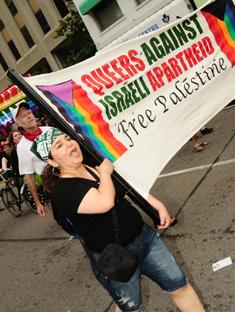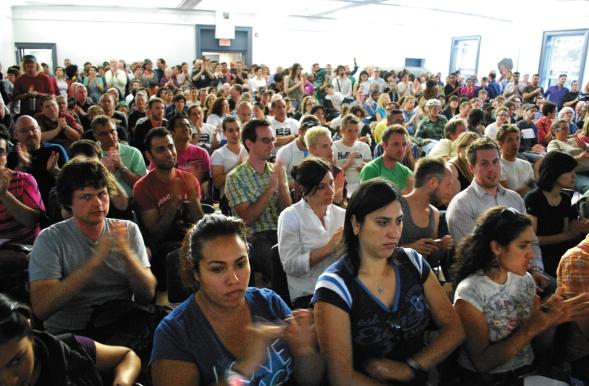Pride Toronto (PT) has reversed its May board resolution banning the term “Israeli apartheid” and will instead require all participants to sign and abide by the City of Toronto’s non-discrimination policy.![]()
Queers Against Israeli Apartheid (QuAIA) — the target of the ban — has declared a victory and congratulated the queer community for pushing PT to reverse its censorship decision.

“This is a victory for the Palestine solidarity movement, which has faced censorship and bullying tactics from the Israel lobby for far too long,” said QuAIA member Tim McCaskell in the release.
PT’s reversal follows outrage in Toronto’s queer community, as many condemned the organization for its restrictions on free speech
in the parade. Read all of Xtra’s coverage of the issue here.
Michael Went was one of the founders of the Pride Coalition for Free Speech, a group that formed in the wake of the announcement. They’ve been working around the clock to organize subversions and competing events since.
Those events included one that attracted 400 people and two others where angry queers marched on the PT offices.
An hour after PT sent out its late-afternoon press release, Went was sitting at a roundtable at a Latin America Pride Coalition for Free Speech meeting to discuss plans for Pride Week.
He was beaming.
“I’m feeling pretty good right now,” says Went.
Brad Fraser, another member of the coalition, says the ban would not have been lifted had it not been for the popular revolt of queer people over the last month.
“It’s a tremendous victory for anyone who dared to speak out,” says Fraser. “I don’t think anyone’s conscience would have turned them around on their own accord, least of all Kyle Rae.”
On May 25, QuAIA members and free speech supporters protested at the PT offices. In response to the ban on “Israeli apartheid,” both the grand marshal and honoured dyke rejected their appointments. On June 7, more than 20 former PT honorees returned their awards in protest.
Matthew Cutler was at that press conference, where he returned a youth award to PT. Like Went, he too hopes the community can begin healing.
“I don’t know that there is an ability to apportion credit. I think we all played a role,” says Cutler. “There were many weeks of people feeling as though they were voiceless, and that they weren’t being listened to. With today’s decision, it’s pretty clear that we were being listened to.”
This ends PT’s second censorship battle this year. In March, PT announced it would vet signs through an “ethics committee,” a move that was roundly condemned and was rescinded two weeks later.
Xtra tried to reach PT executive director Tracey Sandilands at her office, but she chose not to comment. A staff person promised that someone from PT would get in touch tomorrow (June 24).

Hundreds packed the June 7 meeting at The 519, where plans were hatched to protest Pride Toronto’s censorship decision. (Matt Mills photo)
Read the Pride Toronto release below – more to come:
***
Pride Toronto has announced that its recent resolution to restrict the use of certain language during the 2010 parade has been replaced by the requirement that each participating group read, sign and agree to abide by the City of Toronto’s Declaration of a Non-Discrimination Policy, and that all groups that uphold this policy are welcome to participate in the 2010 Pride parade.
During a meeting between members of the board of directors, the executive director and well-respected LGBT community leaders Pastor Brent Hawkes of the Metropolitan Community Church, human rights lawyer and Pride Lifetime Achievement award winner Doug Elliott, and 519 executive director Maura Lawless, the board unanimously voted in favour of a proposal presented by the three.
The proposal is two-fold: the purpose in the short term is to resolve the impasse that the organization has found itself in since moving to disallow the term ‘Israeli apartheid’ in the parade, based on complaints from community members and the assertion by the City of Toronto that the phrase contravenes various city policies. The decision caused widespread dissatisfaction in the queer community and allegations of censorship.
The first motion places the responsibility for determining a violation of city policy back in the hands of the city, as our review process has not established that violation. The second motion establishes a representative advisory panel of community leaders that will lead a broad-based community consultation process with diverse queer communities to recommend a set of strategic principles and a decision-making framework that will help shape future festivals.
“We are extremely grateful to the community leaders that took the time to work on this proposal and help us examine ways to resolve this impasse,” says Pride senior co-chair Genevieve D’Iorio. “The Board’s intention has always been to make the best decision possible to ensure the success of Pride, and we believe that this proposal is a really constructive way forward.”
“There are a large number of people that are sad at the way the community is currently torn over this issue,” says Pastor Brent Hawkes. “Pride has found itself in the middle of a difficult situation, and we felt it was time to step in and see how we could help.”
Doug Elliott agrees. Recently, during a keynote address at the Law Society of Upper Canada’s Pride Event, Elliott spoke out about the history of Pride and the way it has changed over the years. “It’s not always possible to meet everyone’s demands,” he says, noting that some of the demands Pride has experienced are ‘unrealistic.’” This solution upholds city policy without unfairly requiring Pride to interpret that policy regarding a controversial legal question. Hopefully this will allow a harmonious parade this year, while a consultative process unfolds to allow community members to have their say in a constructive way about the future rules for the parade and the ongoing relationship between Pride Toronto and the broader LGBTTIQQ2SA communities.”
In a recent press release The 519 called for public consultation and offered its support and resources to help find a resolution. Lawless stated, “This proposal reinforces how important it is that the diverse queer communities help shape the future of Pride, and I think the Board has shown great courage and foresight in committing to consultation and planning for the future.”
The two motions comprising the proposal are as follows:
That the board of directors approve the following resolutions:
1. Be it resolved that the motion of May 21st regarding language restrictions of groups participating in the 2010 Pride parade be replaced by the requirement that each participating group read and sign and confirm to abide by the City of Toronto’s Declaration of a Non-Discrimination Policy and that all groups that uphold this policy are welcome to participate in the 2010 Pride Parade. Any groups that refuse to sign will not be permitted to participate.
 2. Be it resolved that Pride Toronto appoint a panel of LGBTTIQQ2SA leaders and friends to recommend a policy to protect and advance the qualities of Pride and ensure it is true to its core values and principles. The mandate of the group would be to consult with the community to develop recommendations to ensure a Pride that values and promotes freedom of speech and individual expression, inclusiveness and respect, pluralism and diversity, equity and fairness, celebration, humour and fun, and to make recommendations regarding Pride Toronto’s ongoing working relationship with the broader LGBTTIQQ2SA communities.
2. Be it resolved that Pride Toronto appoint a panel of LGBTTIQQ2SA leaders and friends to recommend a policy to protect and advance the qualities of Pride and ensure it is true to its core values and principles. The mandate of the group would be to consult with the community to develop recommendations to ensure a Pride that values and promotes freedom of speech and individual expression, inclusiveness and respect, pluralism and diversity, equity and fairness, celebration, humour and fun, and to make recommendations regarding Pride Toronto’s ongoing working relationship with the broader LGBTTIQQ2SA communities.
Over the coming days, parade participants will receive a copy of the city’s Anti-Discrimination Policy with a request to sign and return it ahead of the parade. Meanwhile, the team at Pride Toronto will be working hard to finalize arrangements for the 30th anniversary festival. We look forward to the community coming together to celebrate what Pride means to each individual member.
 Why you can trust Xtra
Why you can trust Xtra


